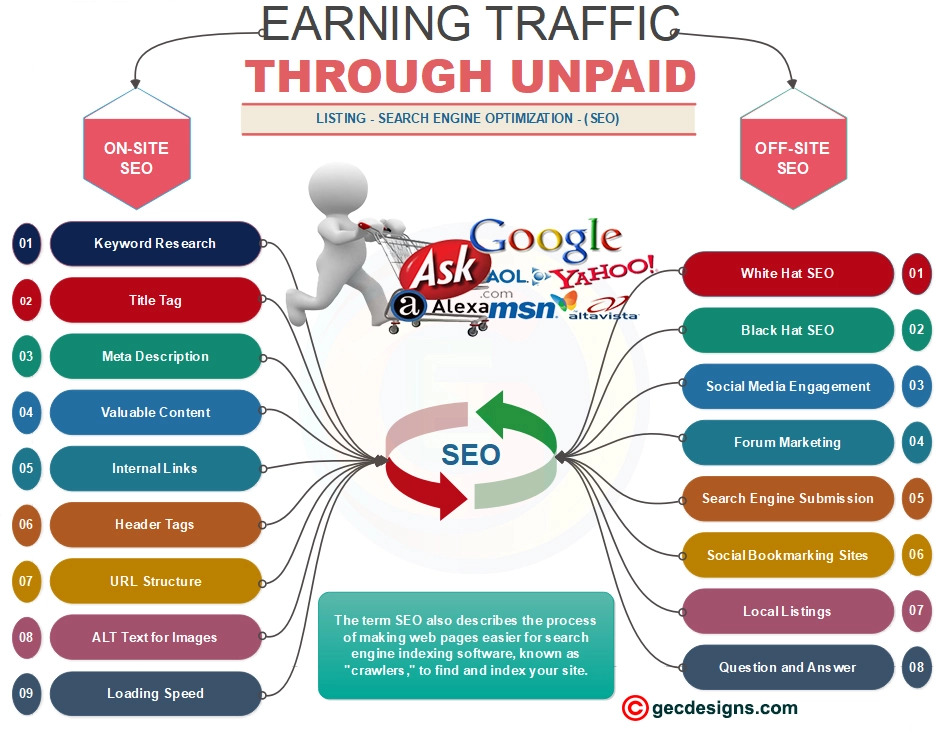What is SEO and how does it work? A beginner's guide
Search engine optimization (SEO) is the optimization of website elements like title, keywords, which can help your website to achieve higher rankings in the search engines. Ultimately, the goal is to attract visitors to your website when they search for products or information related to your business.
Search engines use a mathematical formula called an algorithm for ranking every website. SEO helps to boost the rankings of your website. The spider or crawler follows links to web pages, makes copies of the pages, and stores them in the Search engine index. Based on this data, the Search engine then indexes the pages and ranks the websites.
Search engines consider 3 things while ranking websites
1. Quality of your website
We should offer something unique and valuable content. Do something different which is more creative. You have to convince Google or other search engines for sending signals to searchers about your website. The Web pages on your site include useful information, exciting photographs, and helpful links guiding visitors to other resources.
2. How many websites link to your site?
That is simply known as backlinks which means other sites that link to your site. This is one of the ranking factors in SEO.
3. How people trust your website?
Create a social network, get people to comment. This the only way to prove yourself to Google that you are trustworthy.
Optimization is not a one-time process. It is a continuous process through maintenance, monitoring, and testing.
Tips for improving your website SEO
- Your keywords should be bringing people to your site.
- Your site should be updated on a regular basis
- Your site structure is very important.
- Create high-quality content
- Your website should be secure.
- Use keyword text in your navigation.
- Your site should be load fast.
- Copied content may decrease your SEO rank.
- Your URL structure also very important for SEO.
- Your title tag should accurately describe the content. Avoid extremely lengthy titles.
- Create your sitemap.
- Strategically adjust your site’s navigation and internal links.
- Get to know the Google ranking algorithm.
Search engine optimization (SEO) is the optimization of website elements like title, keywords, which can help your website to achieve higher rankings in the search engines.
How SEO works?
SEO can be broken down into 2 stages
- On-site SEO
- Off-site SEO
On-site SEO
Onsite SEO is known as, which rules can be applied on your site to make it search engine friendly. That involves making sure your website pages, title tags, content, and overall structure is optimized for your target keywords. Web contents, loading speed, the Meta description, Mobile-friendliness there are some key factors to consider here.
On-site SEO factors
Keyword research
Keywords are the phrases that users used to search in search engines for finding the information they require. A keyword analysis is the first step in SEO; in keyword research, you need to find out which set of keywords are needed to be ranked for your website. It can be a single keyword or multiple keywords but you need to decide the keyword. For finding the right set of keywords there are a lot of tools available. Google also provides a keyword planner tool that can help you to figure out the right keyword that is free.
Title Tag
The title tag on pages of your website updates to search engines what the page is about. It should be 70 characters or less. It includes your business or brand name. This tag is placed between the head tags, close to the top point of the HTML code for a particular page. Headings are usually the largest words on the page. Be sure that your target keywords into the headings of each web page, the headings may accurately reflect your page content.
Meta description
Meta tags alert the search engines as to which terms on that particular web page are the most important. The Meta description on pages of your website gives search engines somewhat more knowledge into what truly matters to your page. Meta descriptions also help with keyword rankings. You should write your Meta description in view of your target audience that includes the page’s main keywords, as the Meta description does show up in SERPs. The optimal character length of Meta Description should be 300 or less.
Valuable Content
- Creating valuable content will bring more audience to your site.
- Original content, with chosen keywords, is given higher value in search results. Search engines give low rankings to sites that try to cheat with the overuse of keywords.
- Updated and regularly added content is one of the SEO strategies. Websites that regularly update and add good content to their sites will rank higher in search results.
- The more informational, valuable, and unique content of the website has more opportunities to receive inbound links from other sites.
- More content means more opportunity for deep links. That is the most important factor in SEO.
Internal links
You can help search engines learn more about your website, by internally linking to other pages on your website within your content. Internal links strengthen the value of the website.
Header tags
Three different levels of HTML header tags will help to break the content into sections as well as let search engines know more about what each section of content is about.
H1 - Your H1 header should only be used once on the page. It is your “Page Title”. If your site is divided into columns the left column will appear “higher” in the code. Be sure it does not contain any H1 tags as most likely the center column contains the main content of the page.
H2 - We use the H2 tag only once per page too. H2 tags are your chapter subheadings that give readers a clearer view of what your content covers, and allows them to quickly find the specific information they want.
H3 - H3 tags are used multiple times on a page. H3 tags are subheadings or sub-sub heading. It breaks up page sections and titles to relevant content.
URL structure
If it is possible to put keywords into your URLs. However, do not change all of your current URLs just so they have keywords in them. You shouldn't change old URLs unless you plan on redirecting your old ones to your new ones.
ALT text for images
The content management system (CMS) should allow you to add "alt text" to all images on your website. This text isn't visible to the visitor - alt text is in fact used by screen reader software to help blind internet users understand the content of your images. Search engines crawl images in a similar way, so inserting some relevant keywords while accurately describing the image will help search engines understand your page's content.
Loading Speed
If your site takes more than 3 seconds to load No one has the patience to wait for. There are some key factors to improve your site’s loading speed
- Reducing the size of images
- Eliminate unnecessary plugins.
- Compressing your code
- Avoid adding large amounts of rich content to a single page
- Checking server speed
Off-site SEO
Offsite SEO is known as How to promote your website or blog. Offsite SEO is web optimization done outside of your blog. Offsite optimization doesn’t involve any technical changes on your website, it involves actions such as blog commenting, link building, Social media marketing which are totally independent of your website. By doing Offsite optimization, it helps in indexing your website faster with search engines that help in higher ranking.
It involves,
White hat SEO
White hat SEO is simply known as quality link building.
White hat SEO refers to the usage of optimization strategies and tactics that focus on an audience opposed to search engines. Techniques that are used in white hat SEO include using keywords, keyword analysis, rewriting meta tags in order for them to be more relevant, backlinking, link building as well as writing content for human readers. White hat SEO completely follows search engine guidelines.
Blackhat SEO
Black hat SEO is simply known as low-quality link building.
Black hat SEO refers to techniques and strategies used to get higher search rankings, Blackhat SEO focuses only on search engines and not a human audience. Techniques that are used in black hat SEO include keyword stuffing, blog content spamming, hidden texts, hidden links, and link farming. Blackhat SEO usually does not obey search engines guidelines. It is “cheating the system” to get a quick return from their site. It can be a ban from a search engine and de-indexed as a penalization for using unethical techniques.
Social Media Engagement
One of the best Off-page SEO techniques is social media engagement also known as “Online Reputation Management”. If you want to make your business, website, or blog popular, engage with people on multiple social media platforms. You need to sign up to the popular social networking sites such as Twitter, Facebook, LinkedIn, etc, and create a profile of your own. This will help you to extend your online contacts to interact with your friends, to share things with each other. And also help to build your online reputation.
Forum Marketing
Participate in forums online that are related to your site. And get involved in that community. Reply to threads, answer people’s questions, and give your suggestions and advice. Try to use “Do-Follow” Forums, so that you can include a link to your site within your signature that helps search engines crawl your site.
Search Engine Submission
Search engine submission is an effective tool for web promotion. It refers to getting your website listed to search engines. Search engines will eventually find your site online. But that can take some time. To discover quickly, you should submit directly your website to the most popular search engines like Google, Yahoo, Bing, etc. It helps webmasters to increase the rankings of web pages.
Social Bookmarking Sites
Social bookmarking sites are great platforms to promote your website. Submit your webpage or blog on popular social bookmarking sites like Digg, Delicious, Diigo StumbleUpon, Slashdot. Search engines really like bookmarking sites because the content on these sites is updated very frequently. It will increase traffic to your webpage or blog.
Local Listings
Local listings are an effective way to market your business online. It will help you to promote your products and services to local customers. Local Listings give more visibility to your business. Submit your website to sites like; Google Local, Maps, Yahoo Local, Yellow Pages, etc. This will help you to reach a targeted audience.
Question and Answer
You can get high traffic is from question and answer websites like Quora and Yahoo etc. Join these sites and search for questions related to your business, blog, or website and give clear answers to those questions. You can place a link to your website in the source section. That will help you to bring more visibility to your site.
The Science of SEO
SEO operates mathematical laws that are statistically reliable and predictive of human behavior. Science is systematic knowledge of the material or physical world through observation and experimentation.
The science of SEO is Google’s algorithm which means to understand the facts how it works. Google doesn’t give step-by-step guidelines for the optimization of every single website. Every optimization process is unique. In the optimization process, each website has its own strategies. SEO methods involve planning the strategy, working, implementing, and testing. It involves a combination of on-site techniques and off-site factors.
Tools for beginners
- Google Analytics - Free analytics platform.
- Google Adwords Keyword Tool - keyword research tool of SEO.
- Google Trends - To check seasonal fluctuations in the keyword search.
- Check My Links - Link analysis tool plug-in for Chrome.
- Open Site Explorer - To build the inbound link profile.
- SEMRush (Affiliate Link) - SEMRush is a powerful competitive intelligence suite for online marketing from SEO and video advertising research.
Conclusion
SEO is always evolving so remember, test and test again. Focus more on content Provide informative and excellent content which is useful. Distinguish your website or product from your competitors. Keep an eye on Google updates.SEO is an organic process and takes some time to work so it is very important that you understand the value of patience.

Rajanarthagi
Content writer and Marketer
An enthusiastic SEO expert, passion for digital marketing with two years of expertise in writing Digital Marketing and SEO content. She is a Master of Business Administration graduate from a reputed university in south India. Her passion for SEO and online marketing helps her to stay up to date with the trends and strategies. Follow her on social media sites, to stay up to date with SEO, and Digital Marketing, Updates. To contact Raji, visit the contact page.





